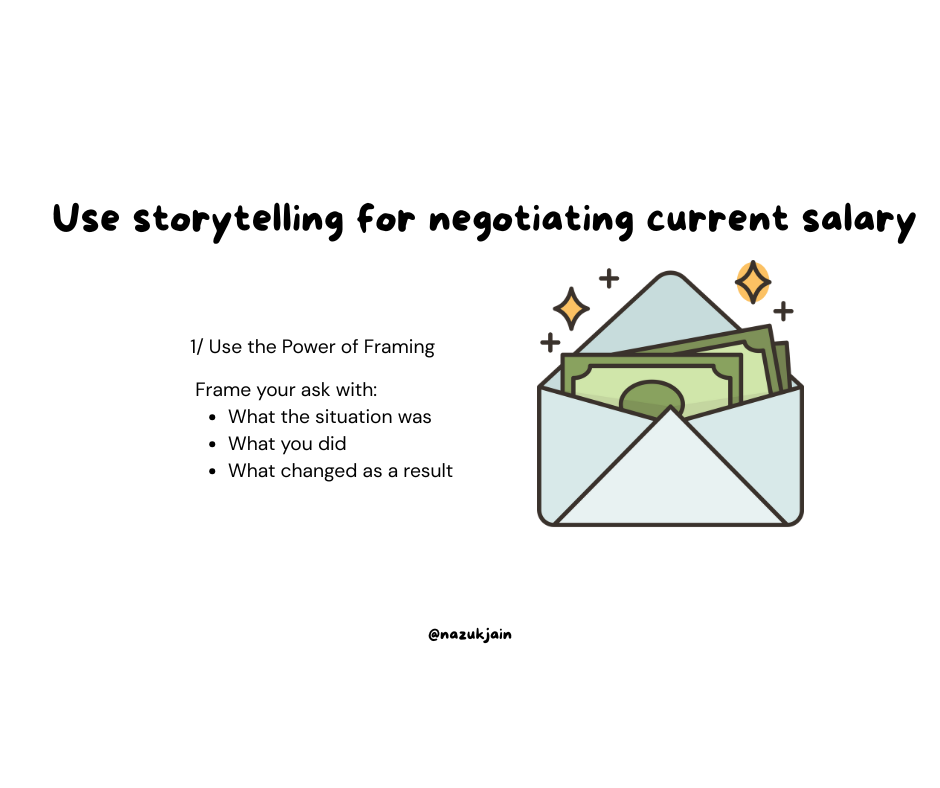💸 The One Skill That Makes Salary Negotiation 10x Easier

Intro
As product managers, we always hear it all the time, become a storyteller. learn the art of storytelling. But what does that mean?
In today's newsletter, I am going to leave you with 3 things
- How to use storytelling for negotiating existing salary, i.e., asking for more in your existing role.
- Mini framework on how to reframe your stories
- AI prompt you can use to craft your story.
Deep Dive
Why Storytelling Works in Negotiation
- It builds empathy: People make decisions based on emotion, then justify them with logic. A story makes your growth and contribution relatable.
- It makes the invisible visible: Your manager may not remember the late nights or leadership moments unless you remind them.
- It turns your value into a narrative arc: They see not just what you’ve done, but where you’re headed.
Storytelling isn’t about spinning fairy tales. It’s about shaping how people see you, your value, your potential, and the impact you create. It’s how you turn dry bullet points on your PowerPoint into impact. How you help others visualize the "why" behind your ask.
And nowhere is this more powerful than in salary negotiation.
Most people think negotiation is about market rates, comp data, or using the right script. And yes, all those things help. But the most effective negotiators don’t just cite data, they move people. They tell a story that makes their value undeniable.
Sign up for Nazuk Jain
Elevate your leadership game, one chronicle at a time.
No spam. Unsubscribe anytime.
Let's use the Power of Framing
Example #1
Imagine you’re about to ask for a raise. You say:
“Based on the industry benchmark, I believe I should be making $160K instead of $145K.”
Now imagine this instead:
“When I joined, our activation rate was under 15%. Today it’s over 40%. That shift came from months of digging into the user journey, designing better onboarding, and pushing for improvements cross-functionally. This work didn’t just improve metrics—it unlocked a new revenue stream. I’m proud of that. I believe my current comp doesn’t reflect the level of ownership and outcomes I now bring.”
That’s a story. It’s clear. It’s specific. It shows growth, ownership, and impact. And it changes how the other person feels about your request.
Example #2
Instead of saying:
“I’ve been here for more than 2 years now, and I think I deserve a raise and a promotion.”
Try this:
“When our payments system went down last quarter, I led the cross-functional triage that got us back up in under 48 hours. But more than that, I proposed and led a post-mortem that turned into a roadmap for system resilience. That roadmap is now part of next quarter’s OKRs. I’m not just reacting to fires—I’m building fireproof systems. I’d like to talk about how my compensation reflects that level of leadership.”
Example #3
Instead of saying:
“I want a raise because I’ve taken on more work.”
Say this:
“Three months ago, our lead PM on the enterprise vertical left unexpectedly. I stepped in, re-prioritized the roadmap, and led the launch of two key features without delays. That effort retained one of our biggest clients, worth $2M annually. I didn’t just take on more work—I protected critical revenue. I’d like to revisit my compensation to reflect this expanded scope and ownership.”
The Framework I used here - The Story-Backed Ask
Instead of saying "I deserve X," use this 4-part structure:
- Start with a moment in time
→ “When I joined…” or “At the beginning of the quarter…” - State the original challenge or metric
→ “Activation was under 15%, and users were dropping off during onboarding.” - Describe the strategic actions you took
→ “I redesigned the onboarding flow, collaborated with design and engineering, and ran 3 A/B tests to iterate quickly.” - Show the business impact and tie it to your ask
→ “Activation increased to 40%, which led to higher trial-to-paid conversions. I’d love to revisit my compensation to reflect this level of ownership and impact.”
Do it this Week
Next time you prep for a salary convo—or even a performance check-in—use this simple storytelling formula:
Before → Action → After
Frame your ask with:
- What the situation was
- What you did
- What changed as a result
Write one such story today. Just one. Practice saying it out loud. You’ll be surprised how much more compelling your pitch becomes.
Because in the end, the best negotiators aren’t the loudest or the most confident.
They’re the ones who tell the most persuasive story.
🧠 AI Prompt:
Copy, paste, and fill this in with your own details:
